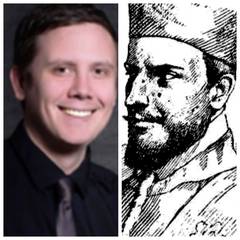|
Back
Acronym’s Guts and Glory New York
Naumburg Bandshell, Central Park
06/13/2023 -
Martin Kennedy: Opening Fanfare (World Premiere)
Anonymous (Biber?/Schmelzer?): Sonata Jucunda a 5 in D minor
Samuel Capricornus: Sonata a 8 in A minor
Francesco Cavalli: Canzona a 8 in C major
Andreas Kirchhoff: Sonata a 6 in G minor
Alessandro Scarlatti: Agar et Ismaele esiliati: Sinfonia a 4
Clemens Thieme Sonata a 8 in C major
Johann Pezel: Ciacona a 6 in B‑flat major – Sonata Enharmonisch a 8 in G minor
Johannn Philipp Krieger: Sonata a 4 in F major
Heinrich Ignaz Franz Biber Battalia a 10 in D major
Times Square Brass, Acronym Baroque Music Ensemble

Acronym at Naumburg (© Stella Dong)
“I’ve just arrived from Albany, where the politics is not Baroque: It’s Medieval.
State Senator Brad Hoylman, introducing Acronym Baroque Ensemble
“If it ain’t Baroque, don’t fix it.”
Anon.
New Yorkers are a pretty rambunctious group, but all eight‑million of us can agree that nobody writes a Sonata a 6 in G minor like Andreas Kirchhoff. Or a Ciacona a 6 in B‑flat major like Johann Pezel. Which is why Naumburg Bandshell was packed tonight for the opening Central Park Summer Festivities.
“I don’t particularly like music,” commented attendee Anthony Crumley. “But when I heard that Acronym Baroque Music Ensemble was doing Johann Philipp Krieger’s Sonata a 4 in F major...well, I put on my dancin’ gear, and took off for the park.”
Inevitably, a few anti‑Sonata a 8 in C major protestors stood outside Naumburg, antiphonally yelling, “Clemens Thieme is Modally Mean!.” But they were quickly shushed out by the audience, so the concert of brass music could begin on time
Seriously even early Baroque devotees couldn’t identify most of the composers here. Yes, Biber’s The Battle is a well‑known terrific curiosity. And Alessandro Scarlatti is a familiar name, though not as well‑known as his son Domenico. So this introduction above was unjust to Acronym Baroque Ensemble.
These dozen‑plus string player with organ and theorbo are virtuosos of the highest order, their specialty finding and performing a plethora of mainly obscure pre‑18th Century music. Their trove, from the archives of European libraries, were temporally synonymous with Johann Sebastian Bach. The music, though, eschewed Bach and Handel to concentrate on the unknown.
And that, in the century‑old Naumburg Bandshell, in the middle of vernal Central Park, was one of the challenges.
The compositions here were originally meant for dark wood‑paneled palace halls, dimly lit by candles, with wine served to the aristocratic audiences by peruke‑topped valets. Listening in the band‑shell, surrounded by towering Central Park trees and wandering audience members searching for seats, one had to overcome the airiness of the strings, the seemingly muddled al fresco sounds.
Once this was accomplished (and it took a few pieces to get accustomed), one could admire not only the virtuosity, but the period instruments–with gut strings which frequently needed re‑tuning.
One also had to admire the introductions by different members of the ensemble. If only we had more of them!
Johann Philipp Krieger is hardly known except to experts. But his Sonata Enharmonisch was written for two consorts–one playing in G minor, the other B minor. An amazing work, for which one had to say, “Eat your art out, Charles Ives.”
Perhaps the audience needed more of an explanation of the “ciacona” of Johann Pezel. But this long series of variations gave chances for all the violins to seemingly improvise. Ditto for Mr. Krieger’s Sonata, which actually sounded like more mutation, a study resembling Purcell’s Ground Variations.

M. Kennedy/F. Cavalli
This was not entirely early Baroque. Each of the forthcoming Naumburg Concerts this summer will start with an original fanfare. The composer last night was the British‑American Martin Kennedy, and his opening for the Times Square Brass quintet made no attempts at “Baroque moderne”. Instead, we had a short jumpy work with fabulous virtuoso work by lead trumpet and the others, partly jazzy, partly lyrical, one‑hundred percent entertaining.
For reasons of the Naumburg Bandshell venue, the only real soloists coming out from Acronym were the alternating violinists, in solo, duo, triple. For those of us who had confined hotshot fiddling to Corelli, Tartini and later Vivaldi, these solos, by composers were themselves masterful violinists, were spellbinding.
Unpredictably, the concert started–and ended–with war! The anonymous composer who wrote about a battle against Ottoman military in the opening Sonata Jucunda a 5 in D minor didn’t quite get the Janissary gongs and drums (that was left a century later to Beethoven in the 9th finale). But the final work, The Battle, by that most original 17th Century composer, Heinrich Ignaz Franz Biber, was a dynamic picture of war at its most ferocious–and most unruly.
This was where Acronym exploded out of their 17th Century pleasantness, to offer, with dissonance, snapping and fervid playing, dissolute troops, prayerful troops, marches, fighting and military songs.
If only all military campaigns were as tuneful, turbulent, buoyant and benign as Acronym’s marvelous musical activity.
Harry Rolnick
|